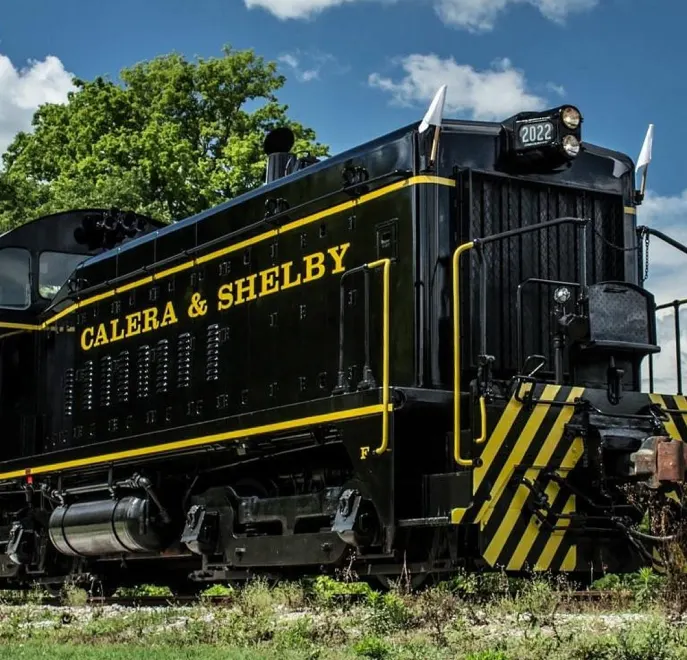Calera, Alabama

Key Outcomes
Saved critical minutes on emergency response times by providing live visibility of railroad crossings before units are dispatched
Over 9,000 citizens used live traffic cameras within the first two months via the MyCalera app
Improved public safety and commute planning through real-time camera access
Off-grid camera system deployed with Verkada LTE and solar for full citywide coverage
Multi-department collaboration between IT, fire, police, and public works
Background
The City of Calera, Alabama, is a fast-growing community just south of Birmingham. Known for its historic downtown and expanding infrastructure, the city faces a unique challenge: two major rail lines run directly through its center, frequently blocking traffic at critical intersections.
For years, train delays disrupted emergency responses, school commutes, and daily life for citizens. Fire trucks were often forced to reroute mid-call, losing valuable time during life-threatening emergencies. To solve this, Calera turned to Verkada.
Challenge: Trains Delaying First Responders and Residents Alike
“Our city has had an ongoing problem with trains blocking railroad crossings, causing delays for our first responders,” explains James Fuller, Chief Information Officer and Public Information Officer. “Our firefighters and police officers wouldn’t know the crossing was blocked until they arrived, sometimes having to turn around mid-response. That’s especially tough when you’re driving a fire truck down a two-lane road.”
These train delays didn’t just impact emergency services—they also frustrated citizens trying to get to work, school, or medical appointments. The city needed a way to give both responders and residents real-time visibility into crossing status—ideally with a solution that could be managed remotely and scale with the city’s growth.

Why Verkada
Live camera access from anywhere via Command and mobile
LTE/solar-powered deployments support areas without infrastructure
Embedded video streams allow for public sharing and transparency
Real-time alerts and visibility improve emergency response coordination
Deployment Strategy: Off-the-Grid and On-the-Go Camera Access
To solve the problem, Fuller and his team deployed Verkada cameras across key railroad crossings, using a mix of on-building and off-grid infrastructure.
On-Building Cameras for City Center
Downtown crossings were monitored by cameras mounted on existing city infrastructure—such as the police department, the public works facility, and Main Street Pavilion.
Off-Grid Monitoring with Verkada Gateways
Remote areas like Highway 22 were outfitted with solar-powered, LTE-enabled Verkada cameras mounted on utility poles. These cameras are supported by Verkada Gateways, allowing Calera to deploy security infrastructure without trenching cable or relying on fiber connections.
“The off-the-grid system at Highway 22 runs on LTE and solar—it’s fully autonomous and transmits directly to Command. It’s been a game-changer for remote visibility,” explains Fuller.
Real-Time Visibility for First Responders and the Public
The real-time video streams from each crossing are displayed on a Verkada Viewing Station inside the firehouse, streaming up to 300 feeds on a single monitor. They’re also accessible from iPads in fire trucks and mobile devices in police vehicles, giving crews the information they need before they even leave the station.
“Now our first responders can see the crossings before they leave the station. If the route is blocked, they can reroute immediately, saving valuable time,” says Fuller.
The public also benefits from this increased visibility. Through the MyCalera app, residents can view the same live feeds via a portal developed by Fuller: www.delayedbyatrain.com. In just two months, over 9,000 residents used the site to plan their commutes.

Results: A Game-Changer for Emergency Services and Public Access
“[Verkada] shaves minutes off our emergency response. This is game changer—and a lifesaver as well,” notes Fire Chief Sean Kendrick.
The camera system has also improved coordination during traffic incidents and breakdowns, like a recent case involving a stalled 18-wheeler. Dispatchers were able to see the blockage live, alert CSX (the rail operator), and notify the public accordingly.
“Before Verkada, they’d have to waste minutes just realizing a route was blocked. Now they know before they even leave the station,” adds Kendrick.
Recognition: GMIS International G2C Award
Calera’s innovative railroad monitoring project recently earned national recognition. In August 2025, the city’s IT Department received the prestigious GMIS International Government-to-Citizen (G2C) Award at the GMIS International Conference in Indianapolis.
This award, given to only one or two municipalities each year worldwide, recognizes outstanding achievement in public sector IT innovation. Calera became just the second city in Alabama to receive the honor, joining past winners from across the United States, Europe, and New Zealand.
The award highlighted Calera’s unique approach: an in-house, cost-effective system that improves emergency response, reduces travel delays, and provides direct, real-time tools for citizens.
Looking Ahead: Expanding Public Safety and Access
Calera continues to invest in public safety, with a new fire station underway near the high school on Highway 25. The upgraded facility will expand service capabilities and provide public meeting space.
“We’re a progressive city. Our leadership places a lot of emphasis on public safety,” says Kendrick. “This system not only helps our responders—it improves quality of life for our citizens, just knowing what’s happening around town.”
Fuller also sees growing value in the MyCalera app, which allows residents to opt into targeted push notifications—from road closures to Main Street events—without relying on social media.
